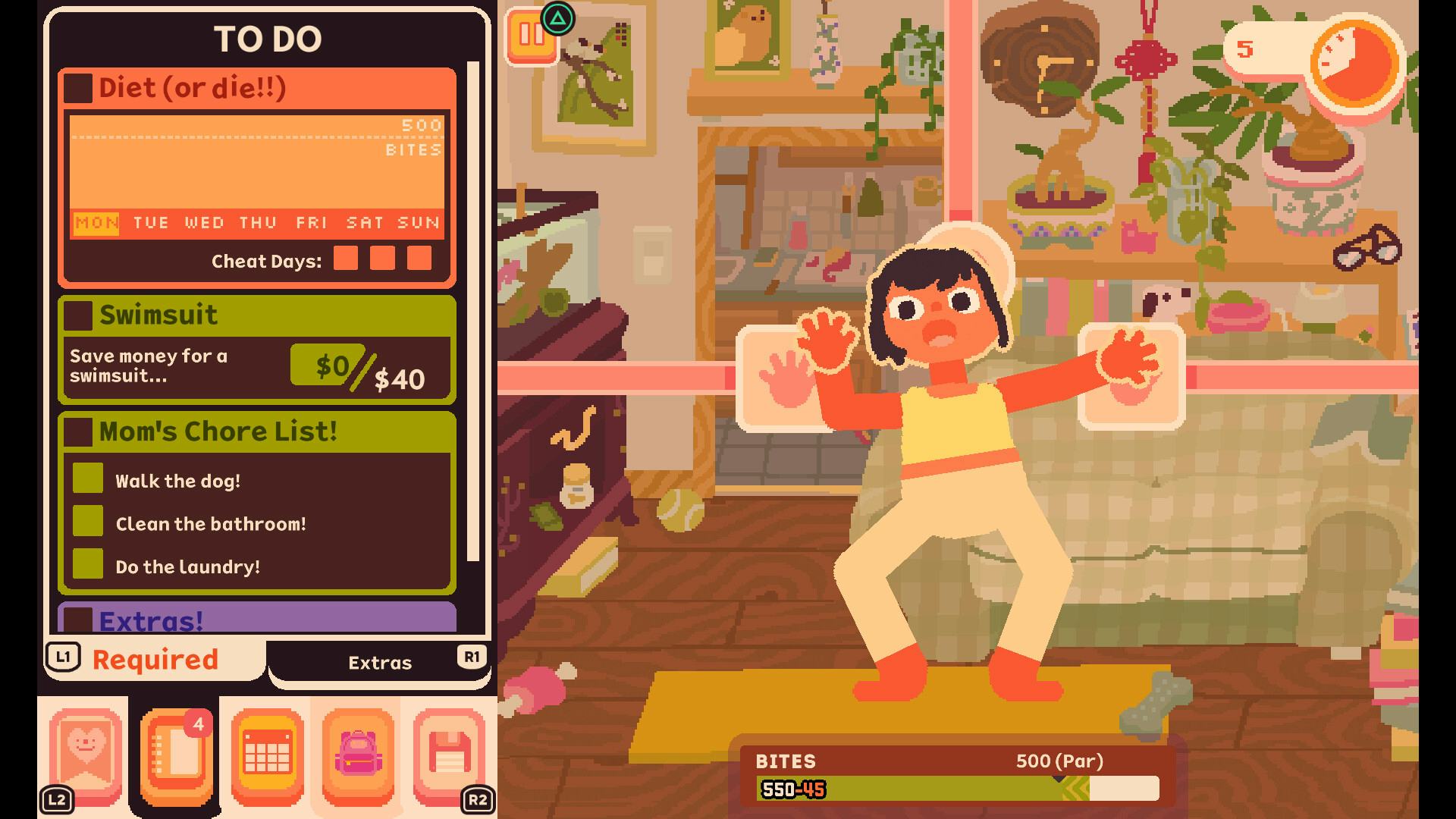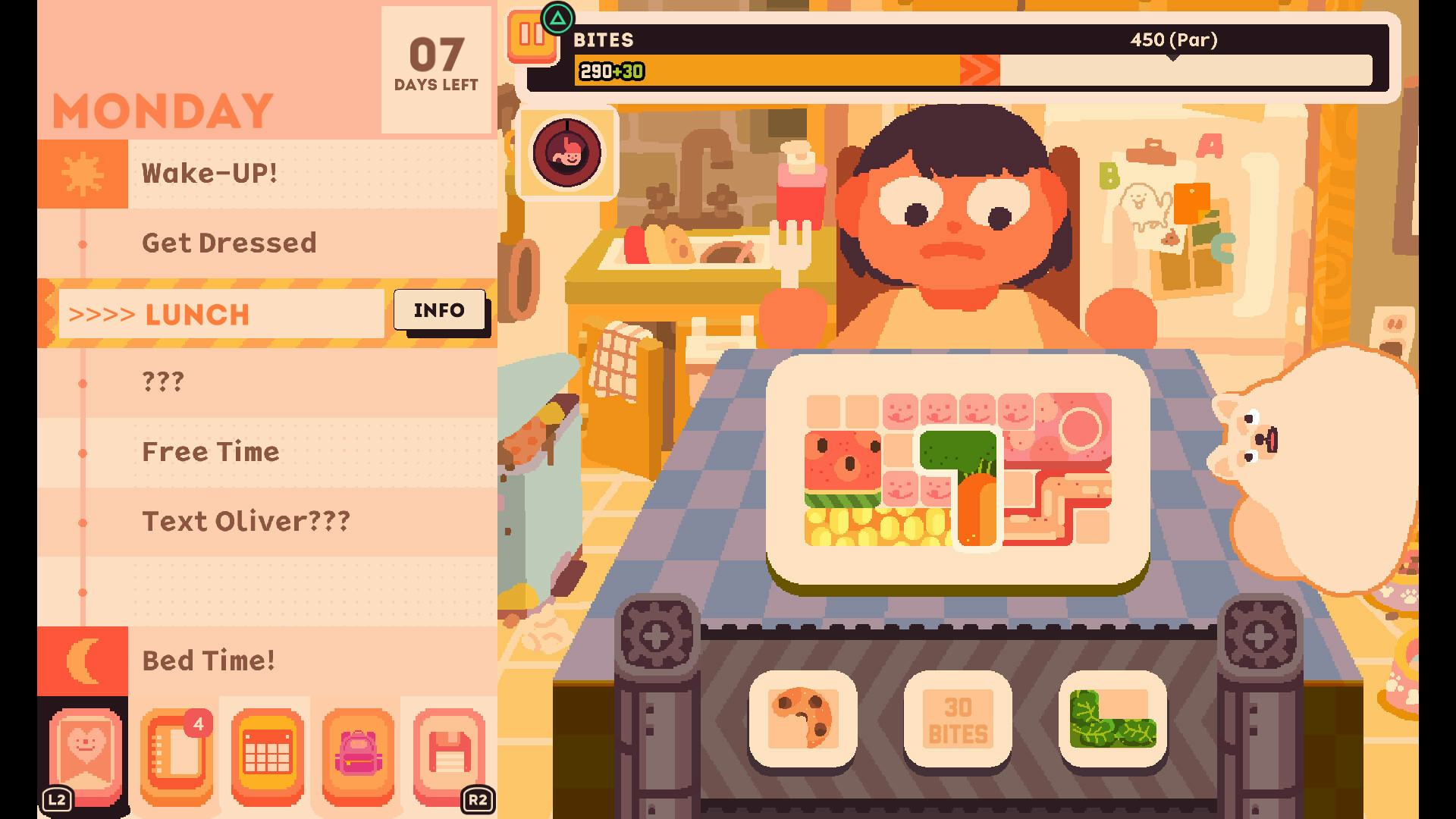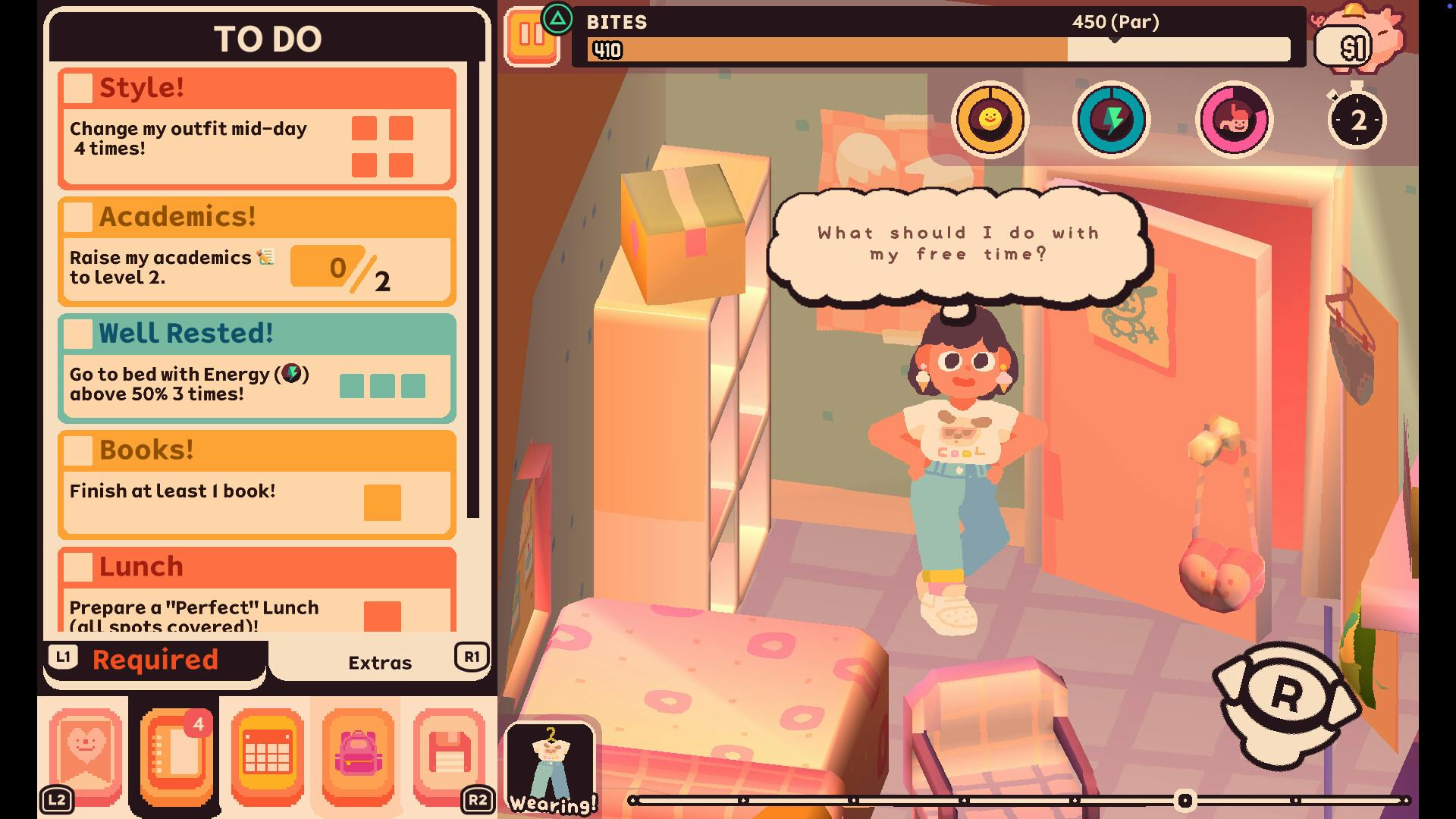
Consume Me is a life sim about the worst parts of its protagonist’s life. Like any life sim, it asks you to spend your time wisely to manage stats that measure your character’s achievements. Only here, instead of running a farm and making friends, you’re maintaining a diet, studying for exams, and trying to keep your boyfriend from breaking up with you. Despite dealing with its teenage heroine’s depression and disordered eating, Consume Me’s sense of humor is a consistent highlight, making it all the more poignant when its darker subject matter peeks through. While its mechanical representations of high school stress are remarkably evocative, a messy third act and abrupt ending keep its heartfelt story from really landing for me.
Consume Me has largely been presented as a game about disordered eating. The story kicks off when protagonist Jenny is scolded by her mother for her eating habits, setting her off on a diet intended to both salvage her self-worth and attract the attention of her crush, Oliver. Diet and exercise are core parts of the game, but the real struggle comes from trying to fit them into a life that makes room for Jenny’s other — often equally destructive — goals.
Stick to the plan

Every day in Consume Me follows more or less the same pattern. First, you choose an outfit, which offers stat boosts and other bonuses, like a faster reading speed or earning more money from chores. Then, you make lunch, stacking Tetris-like blocks of food to fill a grid, being mindful to satiate your hunger without ruining your diet (Consume Me measures food in “bites” rather than weight or calories). A random event can occur next, which might earn you a little extra money, put you in a bad mood, or ruin your outfit and force you to change. Later in the game, activities like school and dates also complicate things, but the core of the choices you’re making come in the free time block of your schedule, which never changes.
Consume Me is as much a minigame collection as it is a life sim. You default to having two actions during your free time, though you can earn more by drinking coffee or staying up late, which have their own drawbacks. Each action you perform has a minigame associated with it, like dragging Jenny into different poses with your cursor to do aerobics, clicking to keep her eyes on a book she’s reading and away from distractions, or dragging makeup onto her face in the mirror to earn stat boosts. Across the board, the minigames are fun, silly, and quick. Consume Me’s sense of humor really comes through in the art in these sections, from Jenny’s extremely unflattering pre-makeup look to the animations for stepping in dog poo when she’s taking her own pooch for a walk. You’ll be repeating the same minigames a lot, and while they eventually lose some of their charm just through repetition, they remain fun throughout.
At the start of every chapter, you’re given a list of goals depending on what Jenny is dealing with at that point in her life. You need to maintain your diet no matter what, but that’s balanced with the need to keep Jenny’s boyfriend on the line, study for tests, save money to buy a swimsuit, and the other demands of teenage life. How you spend your free time is directed by these goals, as well as Jenny’s stats. Most actions will either deplete or fill three meters tracking her happiness, energy, and guts (one of the game’s messier mechanical quirks, which represents both feeling full and feeling courageous), and a lot of Consume Me’s challenge comes from finding ways to squeeze more time out of the day or recharge your meters enough to push yourself to accomplish all of your goals. That becomes increasingly difficult as the game goes on and goals get more difficult, and more unexpected roadblocks begin emerging mid-chapter.
Your own worst enemy

None of that is particularly groundbreaking for a life sim, but the way Consume Me blends its mechanics with its story is what makes it stand out. Getting Jenny to go hungry to stick to her diet and slam energy drinks to stay up late studying is giving her what she wants, and what the game demands, but it’s also undoubtedly hurting her. Along with her mother’s mean comments, Jenny is also contending with her own self-destructive inner monologue, her friends and rivals at school, and the disembodied but always present pressure on women to eat less, achieve more, look prettier, and of course never admit that any of this is a struggle or question why she has to do it at all. Even sleep is no relief, as she’s haunted by unbearable stress in her dreams as well.
And then there’s you, the player. As I’ve written before, the best part of Consume Me is how it inflicts Jenny’s state of mind on you, making you feel accomplished for doing things that you know are bad for you and putting you in a state of chronic stress to reach your self-defeating goals. Not everyone is going to relate directly to Jenny’s exact situation, but unless you’ve lived an unbelievably charmed life, you’ll likely see some parallels to your own experience.
In helping Jenny wreck her own life, I found it impossible not to think about the times in mine when I skipped meals and exercised past the point of exhaustion in pursuit of some unattainable goal, when I slept on the cold basement floor and did worse to punish myself for falling short. More than just making you feel empathy for Jenny, Consume Me does a masterful job of putting you in a mental state where every part of life can be systematized and anything not contributing to the ultimate, unreachable goal of perfection must be shunned. The more I did to keep Jenny locked in that disordered frame of mind, I came to see myself playing not as her, but as the malignant, ever-present miasma of misogyny, fatphobia, and classicism that demand she look and act in one precise, normative way, no matter the consequences.
No happy endings

It’s unfortunate, then, that Consume Me falls apart as it approaches the end. As the story takes Jenny through the end of high school and into college, the demands on her grow ever greater and sudden surprises rearrange her goals with no warning, making it harder to achieve everything she set out to. By the final chapter, the challenge rises to a point that even one unlucky day can mean failing one of your major goals, which in turn means restarting the day that you failed or retrying the entire chapter. Of course, the story can’t progress if Jenny doesn’t do what she needs to get to the next step, but in a game about the difficulty of keeping up with all that’s expected of her, it dulls the impact of failure. There are no lasting consequences for failure, since you must inevitably succeed, which minimizes all the struggle Jenny has gone through up to that point. At the same time, sticking to your diet becomes much easier by the end of the game and becomes little more than an afterthought in the story. It’s another strange muddling of the game’s message, giving the impression that rather than a trap that some people struggle their entire lives to get out of, restrictive dieting is a habit that’s easy to drop when you want to.
Consume Me’s epilogue does offer some explanation for the sudden sidelining of one of its major themes — that’s how it happened in real life. Consume Me is a semi-autobiographical story about one of its creators, Jenny Jiao Hsia, and as an older version of her character explains, dieting just sort of became less important to her after a while. The semi-autobiographical nature of the game also accounts for its rushed, scattered final chapter. In college, Jenny finds spiritual fulfillment, which helps her immensely for a time, before she drops that, too. Her long-distance boyfriend who once hid her from his mother by shoving her in a closet breaks up with her, because of course he does. Jenny gets depressed, moves back home…and the game ends, after shifting into a self-referential montage tracking its own development.
In real life, that’s a perfectly reasonable sequence of events, but it raises the question of why Consume Me needed to follow it so closely. In a game all about turning its protagonist’s struggles into gameplay, it seems odd to end at a low point, where the possibilities to explore her depression through its mechanics would be at their richest. Instead, it ends in anti-climax, leaving this chapter of her life unexplored and the struggles she’s been through up to this point unresolved. Rather than tell the story of how Jenny escaped this low point, Consume Me simply tells you that she did. Most frustrating of all, Consume Me continues to show that it can tell a compelling story with gameplay to back it up, with a fake-out “happy ending” that turns the game’s mechanics on their head in the midst of this montage.
Like Jenny, my struggles with disordered eating and other forms of self-harm are in the rearview mirror. One way to tell that story would be to say that I just outgrew them, and that wouldn't be entirely wrong. But the real story there is one that involves a lot of therapy, hard work, relapses, and undoubtedly a lot of luck and circumstance. Seeing a struggle so familiar to me reduced to an afterthought, a phase that one just gets over, is extremely off-putting, and I can only imagine how much worse it might feel to someone still in its grip.
There’s still a lot to love about Consume Me, up to a point. Its funny, poignant story feels as original as it does relatable, supported by its wonderfully playful art. As an example of how mechanics can evoke emotions and draw players deeper into a story, it’s nearly unrivaled. But the fact that failure is never really an option is at odds with the story it’s trying to tell, and ultimately, the abrupt conclusion to that story undercuts the very points it tries to make. Consume Me is utterly original and in many ways feels like a genuine step forward for personal narratives in games, but while it is worth experiencing on those grounds, it sputters out just shy of being something incredible.
7/10
Consume Me launches on September 25 on PC. Inverse was provided with a PC copy for this review.
INVERSE VIDEO GAME REVIEW ETHOS: Every Inverse video game review answers two questions: Is this game worth your time? Are you getting what you pay for? We have no tolerance for endless fetch quests, clunky mechanics, or bugs that dilute the experience. We care deeply about a game’s design, world-building, character arcs, and storytelling come together. Inverse will never punch down, but we aren’t afraid to punch up. We love magic and science-fiction in equal measure, and as much as we love experiencing rich stories and worlds through games, we won’t ignore the real-world context in which those games are made.







